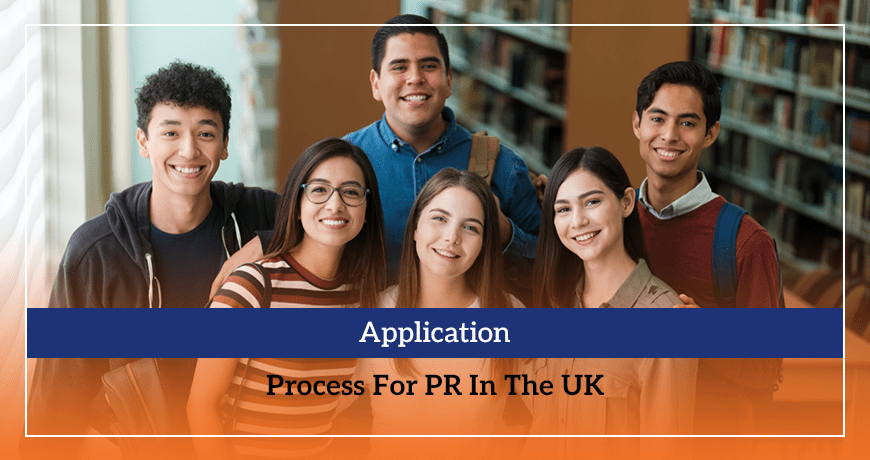Are you trying to figure out how to get PR in UK after study without getting stuck on the wrong visa route? In UK immigration terms, “PR” usually means Indefinite Leave to Remain (ILR), and the path from a Student visa to ILR often runs through the Graduate visa and a sponsored work route like the Skilled Worker visa. Rules, fees, and timelines can shift, so this guide reflects what’s current on 10 February 2026, with key details aligned to UKVI and GOV.UK guidance.
Many students search “how to get PR in UK after masters” and expect a single shortcut. In practice, the goal is to build a clean, lawful timeline, meet settlement requirements like the Life in the UK test, and stay on the right type of permission that can lead to ILR. This article lays out the steps, the common routes, and the mistakes students often make during the switch from study to work.
Understanding The UK Immigration System
The United Kingdom uses a structured visa system with different routes for study, work, and family life, so planning your UK study journey helps you map the steps clearly. Students usually start on the Student visa (older content often calls it Tier 4). After graduation, many move onto the Graduate visa for post-study work, then switch to a sponsored route that can lead to Indefinite Leave to Remain (ILR).
Visa categories are often explained in three broad groups:
- Immigration routes (settlement-focused): visas that can lead to living in the UK long term, often ending in ILR for eligible applicants.
- Temporary routes: time-limited permission for study or work, often used as a bridge into a longer route.
- Family visas: permission based on a qualifying relationship with a person settled in the UK.
Each group contains multiple visa types. Students often move from study permission to a work route once they finish the course and meet eligibility conditions.
Differentiating Between Tier 4 Student Visa and Post-study Work Visa
A Tier 4 visa is the older name many people still use for the UK Student route. A post-study work visa usually refers to the Graduate visa, which lets eligible graduates stay in the UK after a qualifying degree and work in most roles.
The practical difference is simple. The Student route focuses on study conditions and course completion. The Graduate visa is built for work and job search after graduation, and it can be used as a bridge into a sponsored work route such as Skilled Worker.
One timing detail matters for planning. If you apply for a Graduate visa on or before 31 December 2026, you can get 2 years (3 years for PhD/doctoral qualifications). If you apply on or after 1 January 2027, the standard period becomes 18 months (PhD/doctorate stays at 3 years).
Exploring the Options for Transitioning From a Student Visa to a PR
Most students do not move from a Student visa straight into ILR. Students usually take a practical route: finish the course, move onto post-study permission, then switch into a visa type that counts toward settlement.
A common option is the Skilled Worker visa. It needs a valid job offer from a UK employer that can sponsor workers. Students often use the Graduate visa period to find that sponsor and grow UK work experience.
Other options exist for certain profiles, such as family routes, Global Talent, or founder-focused routes, and knowing the basics of switching routes without breaking status can prevent costly mistakes. Eligibility can vary by personal circumstances, job type, salary, and sponsorship status, so planning early helps avoid wasted time and wrong switches.
PR in the UK After a Master’s: Step-by-Step Guide
If you completed a Master’s degree in the UK, the most common plan for 2026 is a clean sequence: Graduate visa for post-study work, then a sponsored work route that can lead to ILR. ILR is the “PR” outcome most students mean when they search this topic.
Complete Your Master’s at a UKVI-Recognised University
The Graduate visa route depends on a qualifying UK course and the university reporting your successful completion to UKVI. Students should check eligibility before course end, since timing matters for the Graduate visa application window, and it also helps to understand acceptable study gaps when you are planning your timeline.
Apply for the Graduate Visa
The Graduate visa lets you stay in the UK for post-study work. If you apply on or before 31 December 2026, the usual length is 2 years (3 years for PhD/doctoral). From 1 January 2027, the standard length becomes 18 months (PhD/doctoral still 3 years).
Costs matter for student planning, so it is smart to explore UK scholarships for international students alongside your visa budget. The application fee is £880, and the healthcare surcharge is usually £1,035 for each year of permission granted on this route.
Secure a Skilled Worker Visa Sponsorship
A Skilled Worker visa needs a sponsor and an eligible job. Many students target roles tied to high demand and look for employers with sponsorship licences. Job eligibility and pay rules use occupation codes and “going rate” logic, so the job title alone is not enough.
Work Continuously for 5 Years
ILR on the Skilled Worker route often requires time in the UK on that eligible route, with compliant work and a clean immigration record. Many students track travel days and keep payslips and work letters organised from day one.
Apply for Indefinite Leave to Remain (ILR)
ILR checks several core items. Salary matters for settlement on Skilled Worker, and the usual salary rule is the higher of £41,700 or the standard going rate for the job, with exceptions in some cases. The Life in the UK test is part of the settlement process for many applicants.
Pro Tip for Indian Students: The High Potential Individual route can apply to eligible graduates from universities on the Global Universities List. This route can help some students stay in the UK and build experience, yet eligibility is narrow and list-based, so planning needs careful checking. (Use official guidance for your year of graduation.)

Requirements For PR In The UK
PR in the UK usually means ILR. ILR requirements differ by route, yet the Skilled Worker settlement path is one of the most common options for international graduates. The Home Office checks time in the UK, salary rules, and settlement requirements like the Life in the UK test.
Length of stay requirements
Many routes require a qualifying period before ILR. Skilled Worker settlement often follows a multi-year pattern on the eligible work route, with time in the UK tracked carefully.
Academic qualifications and their relevance
A UK degree supports employability and can help with sponsor-led hiring. The degree itself is not “PR,” yet it can be a strong bridge into skilled roles that meet sponsorship and salary requirements.
English language and settlement checks
Settlement often involves the Life in the UK test and language-related rules based on the route and prior evidence, so many applicants prepare for an approved English test early in the journey. Many students meet English requirements earlier during the visa journey and focus on the settlement-specific items at ILR stage.
Financial requirements and maintenance funds
Costs can be significant. Students should plan around visa fees, healthcare surcharge payments, and living costs during job search, even when working rights are available.
Character and compliance
A clean immigration record supports any long-term plan. Keep records of visas, travel, and work history, since settlement applications rely on evidence.
Does Student Visa Time Count Toward PR?
Many students ask, “Does my time on a Student visa count toward PR residency?” Most students aiming for Skilled Worker settlement focus on time spent on eligible work routes that lead to ILR, not study permission alone.
The Graduate visa can help students move into sponsored work, yet it is not a settlement route by itself. Students often use it to gain experience and secure a sponsor, then move into Skilled Worker for the qualifying period.
One exception exists in wider immigration planning: the 10-year long residence route, which uses continuous lawful residence rules. Students who consider that route need careful tracking of lawful residence and absences across visa types.

Available Pathways To PR
Students often search for the easiest way to get PR in UK, yet “easy” usually means “clear and realistic.” The strongest pathway is the one that matches your job sector, sponsor availability, and settlement eligibility, with clean evidence across the years.
The Graduate Route
The Graduate route lets eligible international graduates stay in the UK after study for work and job search. It gives flexibility on job type and employer, which makes it useful for students aiming to find a sponsor later.
Eligibility often includes: a valid Student route status at the time of application, a qualifying UK degree, and successful completion reported by the education provider. The Graduate visa fee is £880, and the healthcare surcharge is usually £1,035 per year for each year granted.
Dependants are a common concern, so check the updated rules for Graduate dependants when planning family moves. Partners and children can apply as Graduate dependants if they were already dependants on the Student route, and UK-born children can apply. New dependants usually cannot newly join the Graduate route in most cases, so students should plan family moves early.
Work-Related Routes
Work routes are the most common bridge to ILR after study. The Skilled Worker route is the main option for many graduates, since it leads to settlement when the eligibility rules are met.
Here are the most common work-related routes students consider:
- Skilled Worker Visa: sponsored role, occupation code alignment, and pay rules tied to “going rate.”
- Innovator Founder / Start-up style routes: profile-based options for founders with endorsement and business plans, suited to a smaller group of applicants.
Salary rules matter at settlement stage. For Skilled Worker ILR, the usual salary standard is the higher of £41,700 or the standard going rate, with exceptions in some scenarios.
Family-Related Routes
Family routes can lead to settlement for eligible applicants with qualifying relationships. Many graduates use family routes when they meet the relationship and residence rules, then work toward settlement on that path.
Standard requirements often include a genuine relationship or family link, English language evidence where required, and compliant immigration history. Timelines and evidence can vary, so students should follow the latest Home Office guidance for their category.
Global Talent Visa
Global Talent is suited to people with strong achievements or recognised potential in eligible fields. For the right candidate, it can offer a quicker settlement timeline than many work routes. Eligibility relies on endorsement and field-specific evidence, so it fits a smaller set of applicants.
Top 5 Courses in the UK to Boost Your PR Chances
Course choice affects employability, sponsorship chances, and salary growth. Students who pick a field with steady hiring demand often find it easier to move from Graduate permission to a sponsored Skilled Worker role.
Here are five fields many students target for 2026 planning:
- Artificial Intelligence & Data Science: Strong fit for tech roles that can meet sponsorship criteria in the right job and employer.
- Healthcare (Nursing, Medicine): Health roles often have structured hiring pathways and sponsorship patterns.
- Renewable Energy Engineering: A growing area tied to sustainability projects and infrastructure work.
- Cybersecurity: Security roles can link to regulated sectors with consistent demand.
- Business Analytics: Common in finance, consulting, and operational analytics teams.
Pick a degree with clear job outcomes, then map internships, placement years, and graduate roles early so the sponsor search feels realistic during the Graduate visa period.

Application Process For PR In The UK
The UK PR process is a document-heavy process that rewards planning. ILR applications often rely on clean proof of lawful status, compliant work, and settlement requirements such as the Life in the UK test.
Document requirements and gathering evidence
Start with identity and status documents, then build your evidence pack. Many applicants keep a folder with payslips, bank statements, job letters, and travel records across the full qualifying period.
Completing the application forms
The application is submitted through official channels, and details must match your history. A small mismatch in dates, salary evidence, or absence records can slow the process.
Submitting the application and paying fees
ILR has a fee that can change, so check the official figure near submission. The Skilled Worker ILR fee is shown as £3,029 on GOV.UK at the time of this update.
Biometrics and attending appointments
Most applicants give biometrics as part of the process, and it helps to learn how the BRP process works so you know what evidence to keep. Keep appointment confirmations and submission receipts in your records folder.
Waiting times and processing of the application
Processing times vary by case and service availability. Keep your status valid during the waiting period and keep copies of your full submission.
Decision and appeal process
A successful outcome grants ILR. If a refusal happens, the next steps depend on the reason and the route, so applicants often seek regulated immigration advice at that stage.
Tips For Success
Good outcomes usually come from a clean timeline and solid evidence. Students who plan the Graduate-to-sponsor step early often find the process less stressful during the final months of the Graduate visa.
Pick your target sector and job role early, then build experience that matches the occupation code and pay expectations used in sponsorship and settlement checks. Track travel days, keep payslips, save employment contracts, and keep a simple record of every visa grant and expiry.
Rule changes happen. Review GOV.UK guidance near each major step, since Graduate visa length rules and Skilled Worker salary requirements can shift by date and eligibility group.

Frequently Asked Questions
How to get PR in UK for international students?
Most international students aim for a sponsored route. A common plan is Graduate visa for post-study work, then a Skilled Worker visa with a sponsor, then ILR after meeting time and settlement rules.
How many years to get PR in UK?
Many people qualify after several years on an eligible settlement route. The qualifying period varies by route, and some specialist routes can be faster for eligible applicants.
What is the easiest way to get PR in UK?
Students often call the Skilled Worker path “easy” when they already have a sponsor and a role that meets pay rules. The Graduate visa can help students find that sponsor, yet it does not grant ILR by itself.
Is it easy to get a PR in the UK after studying?
It can be realistic with a clear plan and a sponsor-led job. Students who align degree choice, work experience, and sponsor search timing often have a smoother path.
Can a student visa lead to permanent residency?
A Student visa alone does not grant PR/ILR. Students usually switch into Graduate permission, then move into a settlement-eligible route such as Skilled Worker.
Which course is best for getting a PR in the UK?
Courses tied to skilled roles with sponsorship potential are popular, such as tech, healthcare, engineering, cybersecurity, and analytics. Course choice is one factor; sponsorship and pay rules still apply.
What documents are required when I apply for PR in the UK after my master's?
Most applicants need proof of identity, visa history, proof of lawful residence, proof of employment and salary on a sponsored route where relevant, and settlement items like the Life in the UK test result where required. Route-specific evidence can add more items.
How much is the application fee for students to get UK PR?
Fees change over time. The Skilled Worker ILR fee is shown as £3,029 on GOV.UK at the time of this update.
What are the differences between permanent residence and citizenship?
ILR lets you live and work in the UK without a time limit. Citizenship adds nationality status and passport access, with different rules for time outside the UK.
Do I need to meet English language requirements for PR in the UK?
Settlement checks can include language rules and the Life in the UK test, depending on your route and prior evidence. Many applicants meet English requirements earlier in the visa journey, then focus on settlement items at ILR stage.
What are the fastest ways to get PR in the UK?
Some routes have shorter qualifying periods for eligible applicants, such as Global Talent in the right profile. Family routes can have different timelines for eligible partners. Your personal eligibility shapes the fastest path.
Which courses improve PR chances for Indian students?
STEM and healthcare courses are common choices, since they can connect to sponsor-led roles. Course choice alone does not grant settlement, yet it can raise employability in sponsor-heavy sectors.
Can I bring dependants on a Graduate Visa in 2026?
Graduate visa dependants can apply if they were already dependants on your Student route, and UK-born children can apply. New dependants usually cannot newly join the Graduate route in most cases.
ILR (Permanent Residence) vs British Citizenship: key differences (UK, 2026)
|
Topic
|
Indefinite Leave to Remain (ILR)
|
British citizenship
|
|
Core right
|
Live and work in the UK with no time limit.
|
Citizenship status, with UK passport eligibility.
|
|
Voting
|
Voting rights depend on nationality and election type.
|
Voting rights follow UK electoral rules for citizens.
|
|
Time outside the UK
|
ILR can lapse after long periods outside the UK under certain rules.
|
Citizenship does not lapse just from living abroad.
|
|
Typical time to qualify
|
Often tied to the qualifying period of your visa route.
|
Often follows ILR, with route-based timing rules.
|
|
Application fee (adult)
|
Shown as £3,029 for Skilled Worker ILR at the time of this update.
|
Fees vary by application type and can change.
|
Figures and rules can change by Home Office update cycles, so check official pages near the date you apply.
Conclusion
Student visa, Graduate visa, Skilled Worker sponsorship, and Indefinite Leave to Remain sit at the centre of the UK “PR after study” plan for many international graduates. A strong plan focuses on lawful status, sponsor readiness, salary rules tied to the going rate, and settlement checks like the Life in the UK test.
The practical win is clarity. Know which permission is for post-study work, know which route counts toward settlement, and keep your evidence organised across each year. If you want a smooth next step, follow the roadmap in this guide and double-check the official requirements close to your application date for how to get PR in UK after study.